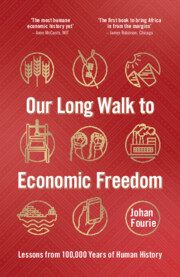Book contents
- Our Long Walk to Economic Freedom
- Our Long Walk to Economic Freedom
- Copyright page
- Dedication
- Contents
- Figures
- Acknowledgements
- A Note on Sources and Terminology
- How Do We Thrive?
- 1 Who Are the Architects of Wakanda?
- 2 What Happened at Blombos in 70,000 BCE?
- 3 Why Are the Danes So Individualistic?
- 4 Why Does isiXhosa Have Clicks?
- 5 How Did Joseph and His Eleven Brothers Solve the Three Economic Problems?
- 6 What Do Charlemagne and King Zwelithini Have in Common?
- 7 Why Do Indians Have Dowry and Africans Lobola?
- 8 Who Was the Richest Man Ever to Live?
- 9 How Did 168 Spanish Conquistadores Capture an Empire?
- 10 Why Was a Giraffe the Perfect Gift for the Chinese Emperor?
- 11 Who Visited Gorée Island on 27 June 2013?
- 12 What Is an Incunabulum?
- 13 Who Was Autshumao’s Niece?
- 14 What Did Thomson, Watson & Co. Purchase?
- 15 What Do an Indonesian Volcano, Frankenstein and Shaka Zulu Have in Common?
- 16 Why Was the Spinning Jenny Not Invented in India?
- 17 Why Did Railways Hurt Basotho Farmers?
- 18 What Did Sol Plaatje Find on His Journey through South Africa?
- 19 Why Can You Have Any Car as Long as It Is Black?
- 20 What Does a Butterfly Collector Do in the Congo?
- 21 Who Wrote the Best Closing Line of Modern Literature?
- 22 How Could a Movie Embarrass Stalin?
- 23 Who Is the Perfect Soldier?
- 24 What Was the Great Leap Forward?
- 25 Why Should We Cry for Argentina?
- 26 Who Was the Last King of Scotland?
- 27 How Did Einstein Help Create Eskom?
- 28 Why Would You Want to Eat Sushi in the Transkei?
- 29 Why Do the Japanese Play Rugby?
- 30 What Do Lego and the Greatest Invention of the Twentieth Century Have in Common?
- 31 What Is Funny about Moore’s Law?
- 32 What Bubbles in Iceland?
- 33 What Did The Economist Get Spectacularly Wrong?
- 34 Will Madiba’s Long Walk to Freedom Ever End?
- 35 What Should No Scholar Ever Do?
- Epilogue
- Notes
- Bibliography
- Index
35 - What Should No Scholar Ever Do?
Predicting the Future
Published online by Cambridge University Press: 30 August 2022
- Our Long Walk to Economic Freedom
- Our Long Walk to Economic Freedom
- Copyright page
- Dedication
- Contents
- Figures
- Acknowledgements
- A Note on Sources and Terminology
- How Do We Thrive?
- 1 Who Are the Architects of Wakanda?
- 2 What Happened at Blombos in 70,000 BCE?
- 3 Why Are the Danes So Individualistic?
- 4 Why Does isiXhosa Have Clicks?
- 5 How Did Joseph and His Eleven Brothers Solve the Three Economic Problems?
- 6 What Do Charlemagne and King Zwelithini Have in Common?
- 7 Why Do Indians Have Dowry and Africans Lobola?
- 8 Who Was the Richest Man Ever to Live?
- 9 How Did 168 Spanish Conquistadores Capture an Empire?
- 10 Why Was a Giraffe the Perfect Gift for the Chinese Emperor?
- 11 Who Visited Gorée Island on 27 June 2013?
- 12 What Is an Incunabulum?
- 13 Who Was Autshumao’s Niece?
- 14 What Did Thomson, Watson & Co. Purchase?
- 15 What Do an Indonesian Volcano, Frankenstein and Shaka Zulu Have in Common?
- 16 Why Was the Spinning Jenny Not Invented in India?
- 17 Why Did Railways Hurt Basotho Farmers?
- 18 What Did Sol Plaatje Find on His Journey through South Africa?
- 19 Why Can You Have Any Car as Long as It Is Black?
- 20 What Does a Butterfly Collector Do in the Congo?
- 21 Who Wrote the Best Closing Line of Modern Literature?
- 22 How Could a Movie Embarrass Stalin?
- 23 Who Is the Perfect Soldier?
- 24 What Was the Great Leap Forward?
- 25 Why Should We Cry for Argentina?
- 26 Who Was the Last King of Scotland?
- 27 How Did Einstein Help Create Eskom?
- 28 Why Would You Want to Eat Sushi in the Transkei?
- 29 Why Do the Japanese Play Rugby?
- 30 What Do Lego and the Greatest Invention of the Twentieth Century Have in Common?
- 31 What Is Funny about Moore’s Law?
- 32 What Bubbles in Iceland?
- 33 What Did The Economist Get Spectacularly Wrong?
- 34 Will Madiba’s Long Walk to Freedom Ever End?
- 35 What Should No Scholar Ever Do?
- Epilogue
- Notes
- Bibliography
- Index
Summary
Predicting the future is a perilous exercise. But that has not stopped us trying. Hunter-gatherers carefully studied their natural environment to predict food availability. The earliest farmers developed sophisticated ways to predict rain. In the eighth century BCE the oracle of Delphi attracted to her temple those who wanted to know the future. Others have searched for clues to future events in bones, marbles, cards and crystal balls. For a quick fix, just page to the horoscope section in your daily newspaper.
It makes sense to want to know the future. Knowledge is power. And power is money. Entrepreneurs must predict the future demands of their customers, the behaviour of their competitors, and the cost of their inputs. In more volatile environments, prediction is more difficult, which increases risk and requires higher reward. That is why it is so difficult to attract investment in unstable times.
- Type
- Chapter
- Information
- Our Long Walk to Economic FreedomLessons from 100,000 Years of Human History, pp. 217 - 225Publisher: Cambridge University PressPrint publication year: 2022

